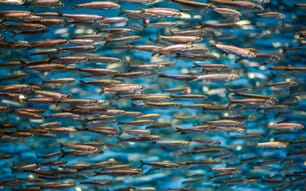With food supplies from wild fisheries reaching a plateau, almost 50 per cent of all the seafood consumed now comes from aquaculture of which six per cent is marine fish farming. The effect of world population growth combined with our increasing consumption of seafood means that the demand for seafood can only be met by aquaculture production.
Like pigs and poultry, many types of farmed fish are fed on formulated diets to ensure they remain healthy and grow at an optimal rate. However, a proportion of these diets rely on raw materials from capture fisheries. Whilst this feed is usually confined to types of fish humans would not choose to eat, it is generally accepted that supplies of proteins (fish meal) and lipids (fish oils) are finite and that alternative sources and diet formulations will be needed.
There is increasing interest worldwide in growing micro and macro algae for a variety of purposes – including biofuels, bioplastics, pharmaceuticals and as raw materials for formulated diets. With its extensive coastline, well established marine research capacity and progressive approach to renewable energy development, Scotland is at the forefront of this activity, with a growing body of research expertise as well as commercial and political interest.
Mark James, from SARF, said: “The use of seaweeds and other algae could help to reduce reliance on traditional sources of raw materials for aquaculture diets. There is also some evidence to suggest that they may have other important properties relevant to fish health and welfare. The fact that seaweeds would largely be cultivated at sea means that there would be no competition for valuable arable land or freshwater resources.
"This project will hopefully provide an objective view on the viability of algae as a raw material source for aquaculture feeds. As ever, the harsh realities of global economics, demand and consumer acceptance will need to be considered, but there is the prospect that seaweeds and their microscopic relatives may play an increasingly important part in our future."
Richard Luney, Wild Fish and Aquaculture Manager from Marks and Spencer said: “As part of our Plan A environmental and ecological initiatives we have committed to sourcing all of our aquaculture species and feeds from the most sustainable sources by 2015. By supporting the SARF project we aim to understand the potential for algae to supplement our aquaculture feeds with ingredients that have the potential to provide essential health benefits to our customers whilst taking some of the pressure off wild fish sources”.
Richard Slaski of Epsilon Resource Management Ltd, the contractor chosen to undertake the research project, said: ”On a global basis animal feeds consume a significant proportion of available fish meal and fish oils. We know that fish oil equivalents, in particular, can be produced by some types of algae. If we can use algae to provide these ingredients, not only will it make feed formulation more flexible, it will cut out some of the intermediate steps in the food chain and aquaculture will be doing its part to reduce pressure on wild fish stocks.”
Dr Piers Hart, Aquaculture Policy Officer for WWF Scotland, who was involved in developing the specification for the review, commented: “WWF welcomes this new approach to help address one of the key challenges for the future of the fish farming industry. The potential for replacing wild fish with seaweeds in feeds for farmed fish is a fantastic opportunity to improve the sustainability of salmon farming and fish farming in general.”
Is Algae The Future Of Global Fish Feed?
GENERAL - The Scottish Aquaculture Research Forum (SARF), in association with Marks and Spencer, has commissioned new research to look at the potential to use seaweed (macroalgae) and other microscopic algae as commercially viable sources of raw materials to feed fish.

